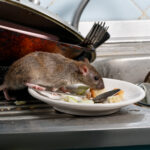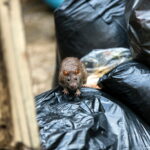How to Safeguard Your Food Facility: Effective Pest Prevention For Food Sectors
How to Safeguard Your Food Facility: Effective Pest Prevention For Food Sectors
Effective pest prevention measures are critical in the food sector. You might think you have everything under control, but have you considered the unseen threats that could be lurking? By
Importance of Pest Prevention
Pest prevention isn’t just a recommendation; it’s a necessity in the food sector. Effective pest prevention is crucial for maintaining food safety standards, preventing property damage, and upholding hygiene practices in food establishments.
Regular inspections by licensed professionals help identify and address potential pest issues before they escalate, reducing the risks of contamination and disease spread. By implementing proactive pest prevention strategies, such as proper waste management and building maintenance, businesses can safeguard their reputation, avoid legal consequences, and ensure the quality of products served to customers.
Regulatory Compliance for Pest Control
Adherence to pest control guidelines is paramount to ensuring compliance with food sector regulatory standards. Regulatory compliance for pest control is essential to prevent contamination and uphold food safety. Guidelines set by the FDA Food Code and BRC standards outline effective pest control practices for food facilities. Following these regulations helps food establishments meet industry standards, mitigate health risks, and maintain a safe environment.
Local health department guidelines and certifications from pest control companies also play a crucial role in ensuring regulatory compliance. Record-keeping requirements for pest control activities are necessary to demonstrate adherence to regulations and best practices. By following these guidelines and maintaining proper pest control measures, food businesses can uphold food safety standards and protect their reputation.
Pest Prevention Methods in the Food Industry
To effectively control pests in the food industry, you must prioritise these practices below:
Pest proofing
Regularly implementing pest-proofing measures is fundamental to maintaining a pest-free environment in the food industry. Pest proofing involves sealing gaps, cracks, and entry points to
Inspections
Routine inspections will help identify pest issues early on and prevent them from becoming larger problems. Inspections should be carried out regularly, especially before food deliveries or during equipment maintenance. Regular monitoring of potential entry points and areas such as storage rooms, kitchens, and equipment can also reveal any signs of infestations.
Food waste
Addressing food waste management is critical to effective pest control in the food industry. Food waste attracts pests like rodents, flies, and cockroaches, providing them with a readily available food source. Proper waste management practices, including timely disposal and securing waste containers, are essential to prevent pest infestations.
Leaving food waste unattended can increase pest activity, posing risks of contamination and property damage. Regularly monitoring and maintaining waste disposal areas is crucial in reducing pest attraction and infestation.
Block control

Regularly inspecting and maintaining these barriers helps deter pests and identify potential entry points for effective pest-proofing.
Inspect All Food Deliveries
A thorough inspection of all food deliveries is paramount to maintaining a pest-free environment in the food industry. Inspecting food deliveries for signs of pests like rodents, insects, or larvae is crucial to prevent contamination in food processing areas. Look for evidence of pests such as gnaw marks, droppings, or webbing on incoming food shipments.
A rigorous inspection process can help catch potential pest issues before they spread within the facility. Training staff to detect pests in food deliveries and properly handle contaminated shipments is essential. Pest control professionals should be utilised to conduct regular inspections of food deliveries and ensure adherence to best practices for pest prevention.
Maintain a Clean Facility
How crucial is maintaining a spotless facility in the food industry to prevent pest infestations and ensure the safety of food products? Keeping a clean facility is paramount in pest prevention. Regular cleaning and sanitation practices eliminate food residue that attracts pests. Proper waste disposal procedures reduce the likelihood of infestations.
Addressing standing water sources that can attract pests is essential.
Consistent cleaning of storage areas and equipment helps prevent pest harborage. Establishing cleaning protocols and checklists for employees promotes a culture of cleanliness, deterring pests. By maintaining a clean facility, you create an unhospitable environment for pests, reducing the risk of infestations and safeguarding the quality and safety of your food products.
Use Trash Cans and Dumpsters with Tight Lids
Using trash cans and dumpsters with secure lids is a fundamental strategy in pest control within the food industry. Secure lids on trash cans play a crucial role in preventing many types of pests,
Properly sealed trash containers reduce the risk of infestations, making it less likely for rodents and other pests to be drawn to the premises. Investing in trash cans and dumpsters with secure lids is a proactive measure to minimise pest activity and uphold food safety standards in food establishments.
Choose a professional partner.
When considering pest control methods in the food industry, choosing a professional partner is a strategic decision that can significantly enhance your establishment’s pest prevention efforts. Partnering with a professional pest control service specialising in food facilities offers tailored solutions for comprehensive pest management. These professional partners like us provide regular inspections, customised treatment plans, and ongoing monitoring to ensure effective control methods are in place.
By outsourcing pest control, food establishments can focus on core operations while staying compliant with regulatory requirements and food safety legislation. Pest control companies bring expertise in identifying entry points, monitoring pest activity, and implementing a pest control program to prevent infestations in food sectors. Collaborating with a pest control partner ensures timely assessments and tailored solutions, strengthening your overall pest prevention strategy.
In conclusion, prioritising pest prevention in food sectors or any other commercial sector is crucial for ensuring food safety, maintaining hygiene standards, and protecting the reputation of your business. You will reduce the risks of contamination and property damage from common pests by implementing effective pest control methods, such as pest proofing, food waste management, and regular inspections.
Partner with Youngs Pest Control for a pest-free environment
Is your food business protected from pests? At Youngs Pest Control, we specialise in providing comprehensive pest management solutions tailored to the food industry. With our regular inspections, regulatory compliance expertise, and customised plans, you can ensure a pest-free environment and safeguard your business’s reputation. Call us today at 0161 776 9832 or email [email protected] to schedule an assessment and strengthen your pest control strategy.
